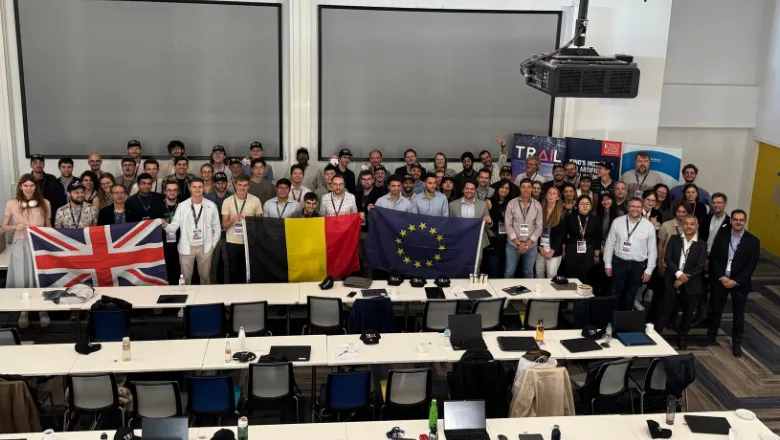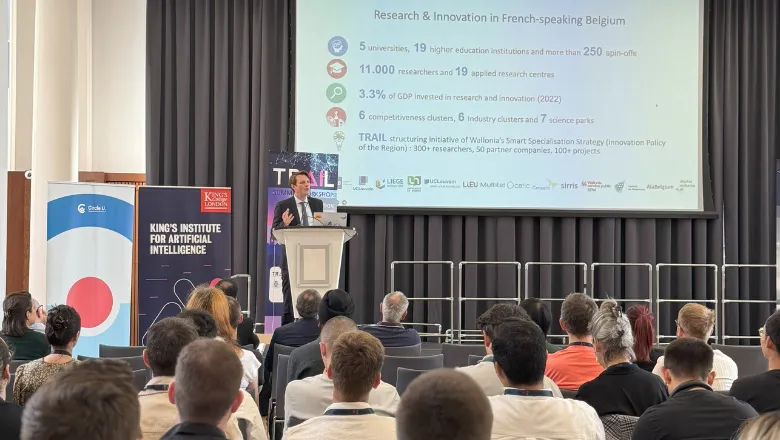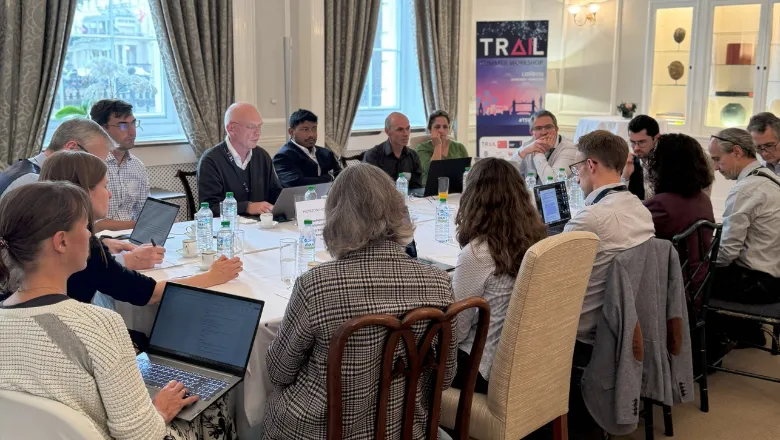16 September 2025
TRAIL Summer Workshop 2025 brings 110 AI researchers to King's
From 25 August to 5 September 2025, King’s College London welcomed 110 young AI researchers from across Europe and beyond for the TRAIL Summer Workshop 2025.

The prestigious international event saw 110 junior researchers from the UK, Belgium, Italy, Germany and more come together for two weeks of collaborative learning, project development and knowledge exchange in artificial intelligence (AI).
Building on a European tradition
Now in its sixth edition, the TRAIL Summer Workshop has previously been hosted in Tournai (2020), Paris (2021), Berlin (2022), Nantes (2023) and Lisbon (2024). This year’s London workshop continued the tradition of providing an immersive environment where participants work closely with senior experts on projects with real-world applications.
Alongside hands-on research, attendees heard from leading academics in the field, exchanged insights, and engaged in discussions on the future of AI.
Exploring the frontiers of AI
Artificial intelligence is transforming every sector of society, from healthcare and education to mobility, energy and industry. Europe is striving to remain at the forefront of this technological revolution.
The TRAIL Summer Workshop provides an immersive environment where young researchers work side by side with experts to co-develop the future of AI. Workshop projects this year addressed domains such as healthcare, Industry 4.0, logistics, aeronautics, space, agri-tech and clean-tech, tackling scientific and societal issues with real-world impact.
In line with this ambition, the 2025 programme covered key scientific themes including:
- Trustworthy AI
- Human–AI Interaction
- Embedded and Energy-Efficient AI
- Privacy-Preserving Approaches
- Multi-Agent Systems
- Social and Ethical Impacts
- AI in Higher Education
Participants also engaged with methods at the forefront of AI research, including physics-based models, digital twins, weakly supervised learning, active learning, natural language processing, generative AI and multimodal AI.
The workshop concluded on Friday 5 September with the team’s projects presentations, insights from institutional leaders such as Circle U. Alliance Secretary-General Mr Kevin Guillaume, King’s College London Vice President of Research & Innovation Sir Bashir M. Al-Hashimi, and the General Representative of Wallonia Brussels to the UK Mr Motonobu Kasajima, and reflections on the future of European collaboration in AI research.

UK–Belgian leadership in European research
This year’s workshop highlighted the growing importance of collaboration between the UK and Belgium in shaping Europe’s AI research landscape.
The TRAIL Institute — established by French-speaking universities in Belgium and several accredited research centres — has become a cornerstone of AI research in Wallonia, bringing together more than 300 affiliated researchers, 50 partner companies and over 100 collaborative projects.
In London, TRAIL partnered with the King’s Institute for Artificial Intelligence and the Circle U. Alliance, reflecting a shared commitment to advancing AI research and reinforcing the UK’s place within the wider European academic community.
The King's Institute for Artificial Intelligence brings together the diverse community in artificial intelligence (AI) at King's College London. AI work lies in every faculty across King’s, with activity spanning core AI (its technical underpinnings), applications and societal implications. The Institute aims to network these researchers and educators, to bring them together with policy makers and those from industry, and the wider public to advance research and to develop the understanding and application of AI in society.
The RCA’s Computer Science Research Centre is an interdisciplinary research centre in design-led computer science, exploring areas including robotics, artificial intelligence, augmented and virtual reality, and advanced visualisation and simulation. The Computer Science Research Centre will not only provide significant and long-lasting benefit to the RCA but also for the wider research community by pioneering the STEAM (science, technology, engineering, art & design, mathematics) agenda. Injecting scientific disciplines into a mix of creative ones will lead to innovative new discoveries.
The Audio Experience Design Lab at Imperial College London includes researchers and projects in areas related with both the physical and the perceptual natures of audio, with particular focus on sonic interaction and user experience. Currently, the main active research areas are: Spatial hearing and binaural audio, Wearable embedded interactive audio systems, Audiology and hearing devices. They put particular attention towards applications and the impact of our research, aiming at both developing novel technologies and techniques, and at using them to improve the quality of life for end users through how they experience audio interfaces.

Strengthening ties through senior-level collaboration
As part of the programme, London also hosted the European AI Networking Event – Belgium & UK Collaboration on Thursday 4 September 2025.
A delegation of 20 senior Belgian researchers, including representatives from TRAIL, met with UK leaders to strengthen partnerships and identify opportunities for future collaboration:
Discussions focused on:
- Joint presentations of Belgian and UK initiatives in AI
- Identification of collaborative project opportunities
- Roundtable discussions to shape joint proposals
Supported by Wallonie-Bruxelles International
The international reach of TRAIL is supported by Wallonie-Bruxelles International (WBI) - Research and Innovation department, whose London office was established in 2023 to strengthen Belgium’s scientific and cultural presence in the UK, and by the network of Scientific and Academic Advisors who have played a central role in supporting the internationalisation of TRAIL.
This representation fosters closer ties between researchers, institutions and industries, ensuring that Belgian expertise is recognised on the global stage.
